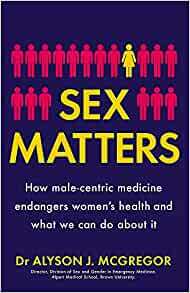Take a photo of a barcode or cover
65 reviews for:
Sex Matters: How male-centric medicine endangers women's health and what we can do about it
Alyson J. McGregor
65 reviews for:
Sex Matters: How male-centric medicine endangers women's health and what we can do about it
Alyson J. McGregor
challenging
informative
inspiring
reflective
medium-paced
Really enjoyed this book. The practical advice on how to advocate for yourself and question medics is particularly good - read this book and make lots of notes!
I read this book as part of a book club with friends. I’m really glad I did since it gave us time to chew on the content. This book is very accessible and understandable. I really enjoyed how there were tips and “take home” messages at the end of every chapter which made me feel like the reader is more of an active participant. The book club ended much like the book did with a conversation about what can we do to change things around how women are treated in the United States medical system. Highly recommend to anyone who was told “it was all in your head” at the doctors office.
informative
inspiring
fast-paced
informative
informative
emotional
informative
inspiring
medium-paced
I was first informed and educated on the data bias against women in various aspects of our soceity in the book Invisible Women: Data Bias in a World Designed for Men by Caroline Criado-Perez. I felt like this books was a good follow up; a deeper dive into subjects particularly pertaining to women's health, everything from prescription medication testing/dosages to actual quality of care.
The author is very obviously an intelligent and qualified professional in her chosen field and has done great advocacy work beyond her practice in medicine to educate doctors and the general population on the gap of care women are exposed to. That being said, I felt like her personal experience and anecdotal evidence was at the forefront of every chapter/topic of the book. I would have cared to have heard stories and experiences from a larger variety of patients and physicians. Her qualifications and professional work are important to her research and her authority on the subject, but they were pointed to multiple times throughout the book after the point had already been made and well established enough.
While the book contains a large appendix and advice with the goal to help women speak up and advocate for themselves - I found some of the questions and advice it offered a bit clunky and heavy handed. It's my understanding that most people don't have the luxury (time, money, energy, population of doctors, infrastructure of healthcare, etc.) in the American healthcare system to go around interviewing doctors/PCPs. I worry opening an initial conversation with a new doctor with a question such as "how do you acknowledge and avoid sexism/racism in your practice?" would only serve to unconsciously write me off as a "hysterical patient" to doctors not as well versed as the author.
Overall, I enjoyed the book, but took stars off for the above points. I still highly recommend to readers interested in the main subject.
The author is very obviously an intelligent and qualified professional in her chosen field and has done great advocacy work beyond her practice in medicine to educate doctors and the general population on the gap of care women are exposed to. That being said, I felt like her personal experience and anecdotal evidence was at the forefront of every chapter/topic of the book. I would have cared to have heard stories and experiences from a larger variety of patients and physicians. Her qualifications and professional work are important to her research and her authority on the subject, but they were pointed to multiple times throughout the book after the point had already been made and well established enough.
While the book contains a large appendix and advice with the goal to help women speak up and advocate for themselves - I found some of the questions and advice it offered a bit clunky and heavy handed. It's my understanding that most people don't have the luxury (time, money, energy, population of doctors, infrastructure of healthcare, etc.) in the American healthcare system to go around interviewing doctors/PCPs. I worry opening an initial conversation with a new doctor with a question such as "how do you acknowledge and avoid sexism/racism in your practice?" would only serve to unconsciously write me off as a "hysterical patient" to doctors not as well versed as the author.
Overall, I enjoyed the book, but took stars off for the above points. I still highly recommend to readers interested in the main subject.
informative
fast-paced
A a disappointing read, very nearly a DNF.
I think the subject matter is hugely important, but this was not well written or edited. It is clearly for the US market due to their specific healthcare system and so I think would also be more relevant to medica professionals in America.
The author spent the first 3 chapters repeated the same information about heart attacks and strokes over and over. Including some parts of the "Take aways" being word for word the same.
A lot of this book is filler, listing people's letters after their names, their hospitals and memberships to various groups. As well as explaining the meaning of certain words, while leaving others unexplained. The editing seemed sloppy with some names/conditions being shortened to Initialisms only to then be used as the full name again in the same paragraph. This could have been easily edited down into a leaflet or bulked out and made more human and accessible with some more patient stories. Infuriatingly one story was introduced at the end to highlight a point of Googling symptoms and when that can be useful. The author chose to omit the final diagnosis of the patient, probably deeming it irrelevant to her point but forgetting that story telling is such an important part of books like this.
I think the subject matter is hugely important, but this was not well written or edited. It is clearly for the US market due to their specific healthcare system and so I think would also be more relevant to medica professionals in America.
The author spent the first 3 chapters repeated the same information about heart attacks and strokes over and over. Including some parts of the "Take aways" being word for word the same.
A lot of this book is filler, listing people's letters after their names, their hospitals and memberships to various groups. As well as explaining the meaning of certain words, while leaving others unexplained. The editing seemed sloppy with some names/conditions being shortened to Initialisms only to then be used as the full name again in the same paragraph. This could have been easily edited down into a leaflet or bulked out and made more human and accessible with some more patient stories. Infuriatingly one story was introduced at the end to highlight a point of Googling symptoms and when that can be useful. The author chose to omit the final diagnosis of the patient, probably deeming it irrelevant to her point but forgetting that story telling is such an important part of books like this.





